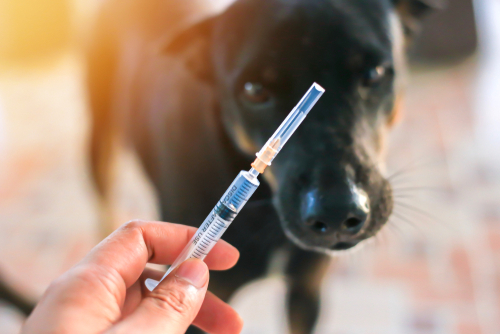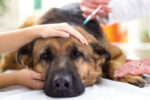 We recommend that all dogs are vaccinated against a core combination of several viruses and some bacteria. So the main vaccination course that all dogs will have will consist of two vaccinations, either two or four weeks apart, followed by annual vaccinations. Now these annual vaccinations do not always cover everything that they were vaccinated at the beginning and the main reason for this is that certain vaccinations will last for up to three years in your dog, so there is no need to repeat those on an annual basis. The main things we vaccinate against are distemper, hepatitis, parvovirus, parainfluenza and leptospirosis. The parts that last for three years are hepatitis, distemper and parvovirus parts. The leptospirosis part comes in two different forms and it is up to you to speak to your vet and look at the lifestyle of your pet to decide which part of that leptospirosis vaccine that you would like to use. But the leptospirosis, whatever type it is, does require an annual vaccination to be kept up to date in your pet’s bloodstream.
We recommend that all dogs are vaccinated against a core combination of several viruses and some bacteria. So the main vaccination course that all dogs will have will consist of two vaccinations, either two or four weeks apart, followed by annual vaccinations. Now these annual vaccinations do not always cover everything that they were vaccinated at the beginning and the main reason for this is that certain vaccinations will last for up to three years in your dog, so there is no need to repeat those on an annual basis. The main things we vaccinate against are distemper, hepatitis, parvovirus, parainfluenza and leptospirosis. The parts that last for three years are hepatitis, distemper and parvovirus parts. The leptospirosis part comes in two different forms and it is up to you to speak to your vet and look at the lifestyle of your pet to decide which part of that leptospirosis vaccine that you would like to use. But the leptospirosis, whatever type it is, does require an annual vaccination to be kept up to date in your pet’s bloodstream.
The other vaccine that dogs can have is the kennel cough vaccine. Now we do not use this routinely because it does depend a little bit on the lifestyle of your dog and whether they are going to be coming into contact with other dogs, or whether you are in contact with lots of other dogs. But again, this is something that you would discuss with your vet as to whether it was required for your dog or not. It covers against the parainfluenza and the Bordetella bronchiseptica and these are the main two organisms of kennel cough. So dogs that are unvaccinated or become out of date with their vaccinations are then susceptible to picking up these diseases. We still see cases of parvovirus in this country and we still see cases of leptospirosis, so distemper happily has been eradicated from the UK, but we have continued to vaccinate against it to make sure that we do not get cases. The parvovirus is more common in puppies and can also happen in older dogs because their immune systems are not as healthy and as fit as they would have been when they are an adult.
When they do get the parvovirus it can be fatal, especially in the younger dogs because they just do not have the reserves and the fight to get over it, so it is really serious when they get it. And for that reason vaccination is so, so important for dogs. As soon as one animal does have it, as soon as one dog does get the parvovirus, it is highly contagious and so any other dogs that have been in contact with that dog, if they are un-vaccinated are likely or at risk of getting that parvovirus infection as well.

